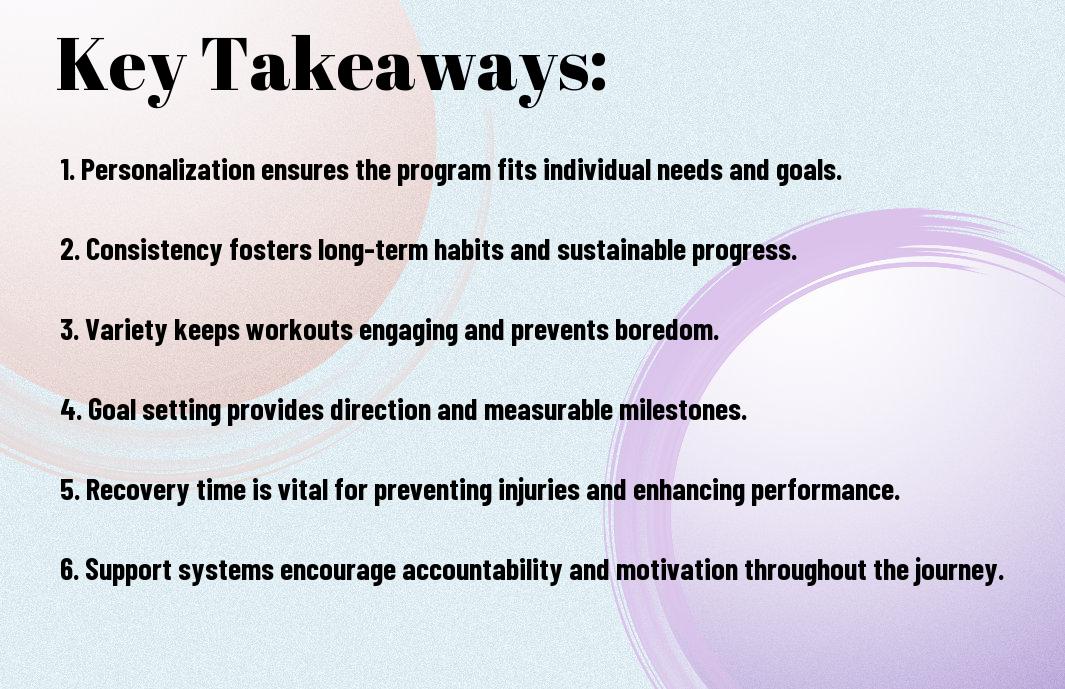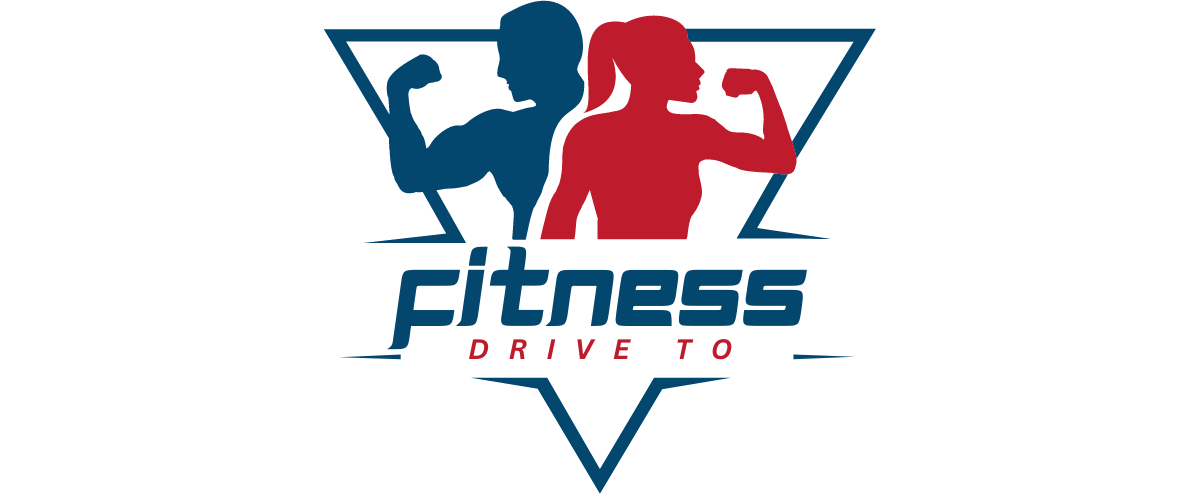Many people underestimate the importance of a comprehensive fitness system tailored to your individual preferences and goals. This guide will introduce you to the 10 important components that can improve your physical well-being and align with your unique lifestyle. Whether you’re a busy professional, a stay-at-home parent, or someone exploring fitness for the first time, implementing these elements will not only enhance your motivation but also ensure that you stay safe and injury-free on your fitness journey.

Key Takeaways:
- Personalization: Tailoring a fitness plan to individual needs and preferences enhances motivation and adherence.
- Variety: Incorporating different types of workouts keeps routines fresh and engages various muscle groups.
- Consistency: Establishing a regular exercise schedule is vital for long-term improvement and results.
- Nutrition: Complementing workouts with a balanced diet supports overall health and fitness goals.
- Goal Setting: Setting achievable and measurable objectives provides direction and a sense of accomplishment.

Personalized Goals
Before begining on your fitness journey, it’s imperative to establish personalized goals that resonate with your lifestyle. Understanding that your fitness path is unique allows you to develop a system that works for you, prioritizing what matters most and accommodating your individual circumstances.
Define Specific Objectives
Now, take the time to outline your specific objectives. Instead of vague aspirations like “getting fit,” aim for concrete targets such as “running a 5K in under 30 minutes” or “losing 10 pounds in three months.” Specific objectives provide a roadmap and help you stay motivated.
Set Achievable Targets
While it’s great to dream big, setting achievable targets is vital for your success and overall well-being. Break down your larger goals into smaller, realistic milestones that can be accomplished within a reasonable timeframe. This approach fosters a sense of achievement and keeps you motivated on your fitness journey.
To effectively implement this strategy, consider your current fitness level and lifestyle when selecting targets. Setting goals that are too ambitious can lead to frustration and burnout. Instead, focus on incremental improvements that challenge you without overwhelming you. For example, if your goal is to improve strength, aim to increase your weights by a small percentage over time. Celebrating these small victories will contribute positively to your motivation and commitment, ensuring you remain on track and engaged long-term.
Balanced Nutrition
If you’re aiming for a successful fitness system, balanced nutrition is vital. It’s not only about counting calories; it’s about fueling your body with the right nutrients to enhance energy levels, promote recovery, and support overall health. By integrating a variety of food groups including proteins, healthy fats, and carbohydrates, you can enhance your workouts and wellbeing, making it easier to fit fitness into your lifestyle.
Healthy Meal Planning
On your journey toward a balanced diet, healthy meal planning serves as a helpful tool. By organizing your meals in advance, you can ensure you’re incorporating a variety of nutrients while avoiding the stress of last-minute decisions. Planning allows you to make mindful choices, set achievable goals, and enjoy diverse foods that sustain your lifestyle and fitness aspirations.
Portion Control Strategies
You can make a significant difference in your nutrition by practicing portion control. This strategy helps you to avoid overeating and ensures that you enjoy your meals without excess. By understanding proper serving sizes and using tools like measuring cups or portion plates, you can balance your meals effectively, keeping your energy levels stable while working toward your fitness goals.
Nutrition is integral to your overall well-being, and mastering portion control can transform your approach to eating. Start by understanding recommended serving sizes and utilize visual cues to help gauge portions—like using your hand as a guide. Be mindful of eating slowly, allowing your body time to signal when you’re satisfied, which helps prevent unwanted weight gain. Adjusting your grocery shopping includes buying smaller packages or pre-portioned snacks, which can help maintain your portion goals and support your fitness journey.
Regular Exercise
All successful fitness systems include regular exercise, which is necessary for maintaining your overall well-being. This component not only enhances your physical health but also boosts your mental clarity and mood. Incorporating a mix of cardiovascular, strength, and flexibility exercises can yield the best results, no matter your personal goals or lifestyle. The key is to make it a priority, ensuring that you reap the benefits that come with consistent practice.
Find Enjoyable Activities
Enjoyable activities are the cornerstone of a sustainable exercise routine. Identifying workouts that you genuinely look forward to will make it easier for you to stay committed. Whether it’s dancing, swimming, hiking, or group classes, the more fun you have, the less it will feel like a chore. It’s important to explore various options to find what truly excites you.
Create a Consistent Routine
An effective fitness system thrives on a consistent routine. Establishing a regular schedule for your workouts means you’ll make it part of your day-to-day life. Setting regular days and times for exercise allows you to integrate it smoothly into your lifestyle. The key to sustained progress is consistency—by showing up for your workouts regularly, you develop a habit that encourages you to push through even when motivation wanes.
Regular exercise at dedicated times can greatly improve your adherence to your fitness goals. When you stick to a consistent routine, your body begins to adapt, enhancing your strength, endurance, and flexibility over time. This structure helps to reduce decision fatigue about when to work out, making exercise a non-negotiable part of your life. As a result, you’ll see positive changes in your physical appearance, energy levels, and overall health. Additionally, a routine instills a sense of discipline, making it easier for you to embrace other healthy habits.
Progress Tracking
Your fitness journey hinges on the ability to track progress effectively. By regularly monitoring your achievements, you can adjust your strategies, celebrate milestones, and maintain motivation. Implementing a structured system for tracking can help you gain insights into your performance and ultimately improve your results. For more guidance, check out 10 Essential Tips for Starting Your Fitness Journey – The M.A.C.
Monitor achievements regularly
You’ll find that documenting your progress, whether it’s through journaling, apps, or fitness trackers, allows you to see how far you’ve come. This visibility fosters a sense of accomplishment and encourages you to push further towards your goals.
Adjust plans as needed
Assuming you are tracking your progress effectively, you should be prepared to alter your fitness plans when necessary. Adaptation is key to overcoming plateaus and ensuring continued improvement.
Monitor your accomplishments and setbacks closely. If you notice a lack of progress or increased difficulty, it’s important to reassess your workout intensity, increase your rest days, or modify your nutrition. Listening to your body will help you avoid injury and burnout, leading you to a healthier and more enjoyable fitness experience.
Flexibility and Adaptation
Once again, embracing flexibility and adaptation in your fitness system is vital for long-term success. Life is often unpredictable, and your ability to modify your routine according to changes in your environment, schedule, or physical condition can significantly impact your progress. By integrating this mindset into your fitness journey, you’ll remain committed and resilient, no matter the obstacles you face.
Be open to changes
Clearly, being open to changes is imperative for maintaining motivation and achieving your fitness goals. When you acknowledge that unexpected situations may arise, you can adjust your workout plans, dietary choices, or recovery practices without straying from your overall objective. This adaptability fosters a more sustainable and enjoyable fitness experience.
Overcome plateaus effectively
One way to maintain your progress is to overcome plateaus effectively. Stagnation in your fitness journey can be demotivating, but it’s imperative to approach these moments with a problem-solving mindset. Evaluating your routine and making necessary adjustments will keep your body challenged and engaged.
Effectively overcoming plateaus involves identifying the signs of stagnation, such as reduced strength gains or lack of weight loss. It’s important to reassess your training methods and ensure you’re incorporating a mix of intensity and variety. Consider upgrading your workouts, whether it be increasing weights, trying new exercises, or altering your schedule. Additionally, focus on prioritizing recovery through rest days and nutrition to allow your body to adapt and progress. By addressing plateaus proactively, you ensure a smoother fitness journey.
Support System
Not having a reliable support system can make your fitness journey feel overwhelming. Surrounding yourself with a network of friends, family, or peers who share similar fitness goals can provide the encouragement and motivation needed to stay on track. Whether it’s participating in group workouts or simply having someone to check in with, the right support can significantly impact your success and maintain your dedication to a healthier lifestyle.
Engage with a Community
While initiateing on your fitness journey, engaging with a community can enhance your experience significantly. Whether you choose to join a local gym, participate in online forums, or attend group classes, the camaraderie and shared experiences can boost your morale. It creates a sense of belonging that motivates you to push through challenges, celebrate victories, and foster friendships that extend beyond the gym.
Seek Professional Guidance
An effective way to navigate your fitness journey is to seek professional guidance. A certified personal trainer or fitness coach can tailor a program specifically to your needs, ensuring you make the most of your workouts while minimizing the risk of injury. Their expertise can help you set realistic goals and make adaptations as necessary, keeping you motivated and engaged.
Plus, having a professional by your side means you gain valuable insight into form and technique, which can be particularly beneficial if you’re new to exercise. This guidance not only improves your performance but also reduces the likelihood of injuries that can derail your progress. Moreover, a professional can provide you with a structured plan to keep your fitness journey both effective and enjoyable, allowing you to achieve results more efficiently.
Recovery and Rest
Unlike the common misconception that more workouts always lead to better results, recovery and rest are vital components of any successful fitness system. Proper rest helps your body repair and rebuild, preventing injuries while enhancing performance. By integrating recovery strategies into your routine, you support your overall health and ensure sustainable progress, regardless of your lifestyle.
Prioritize sleep quality
Even though it can be tempting to sacrifice sleep for extra workout time, prioritizing sleep quality is vital for your fitness journey. Quality sleep enhances muscle recovery, cognitive function, and hormonal balance, which all contribute to improved performance and well-being. Aim for 7-9 hours of restful sleep each night to maximize your gains and rejuvenate your body effectively.
Incorporate rest days
Prioritize scheduling regular rest days in your workout routine to allow your body to recover and restore. Overtraining can lead to burnout, injuries, and decreased performance, ultimately hindering your progress. Make rest days a priority by coordinating them with your training schedule, and consider light activities like stretching or yoga to promote relaxation. Your body and mind will thank you, leading to better results in the long run.
You can enhance your overall fitness by recognizing the importance of incorporating rest days into your regimen. Taking time off allows your muscles to heal and grow, reducing the risk of injury and fatigue. While it may seem counterproductive, prioritizing recovery will result in improved strength and endurance when you return to training. Listen to your body, and make sure to provide it with the rest it needs to thrive.

Mindset and Motivation
Many people underestimate the power of a positive mindset and motivation in achieving fitness goals. It’s vital to cultivate a mental environment that fosters growth and resilience. Your approach to fitness should be about making sustainable changes, focusing on progress rather than perfection, and finding joy in the journey. By embracing the right mindset, you can overcome challenges and maintain your commitment to a healthy lifestyle.
Cultivate Positive Thinking
Clearly, adopting a positive mindset transforms how you approach fitness challenges. Positive thinking can influence your determination, helping you stay focused on your goals and integrating fitness into your daily life. By shifting your perspective to focus on what you can achieve rather than what seems impossible, you’ll foster a healthier relationship with yourself and your fitness journey, making it easier to stay motivated.
Use Visual Reminders
While it may seem trivial, incorporating visual reminders into your fitness regimen can significantly enhance your motivation. These reminders serve as constant prompts to help keep your goals at the forefront of your mind. By placing images, quotes, or even your workout schedule in visible areas—like your fridge or workspace—you create an environment that supports your fitness journey.
The integration of visual reminders plays a vital role in maintaining your motivation. This technique can make a significant impact on your daily decisions and overall mindset towards fitness. By surrounding yourself with inspirational images or motivational quotes, you create a visual environment that encourages you to stay committed to your goals. These powerful reminders can also help counteract negative thoughts and feelings that arise, guiding you back towards your fitness aspirations whenever you feel distracted or discouraged.
Education and Knowledge
Now, to create a successful fitness system that fits your lifestyle, embracing education and knowledge is imperative. Understanding the principles of fitness, nutrition, and recovery will empower you to make informed choices. Building a strong foundation of knowledge helps you avoid common pitfalls and fosters a sustainable approach to your health and wellness goals.
Stay informed on fitness
Informed decisions come from staying up-to-date with the latest fitness trends, research, and expert advice. Subscribing to reputable fitness journals, following experienced trainers, and participating in workshops enable you to enrich your understanding of effective workout techniques and nutrition strategies tailored to your specific needs.
Learn from experiences
With every workout, you gain invaluable insights into what works best for your body and lifestyle. Tracking your progress and reflecting on both successes and challenges helps you fine-tune your approach. Embrace setbacks as learning moments and celebrate your achievements, no matter how small. It encourages growth and resilience, urging you to adapt your strategies as you evolve in your fitness journey.
It is imperative to analyze your past experiences in fitness as they shape your future successes. Whether you faced injuries, struggled with motivation, or discovered a workout you love, each moment contributes to your personal development. By understanding what has or hasn’t worked for you, you can craft a more tailored and effective fitness routine. Use your experiences to identify patterns and make informed adjustments, helping you stay committed and achieve your long-term fitness goals.
Summing Up
With this in mind, incorporating the 10 necessary components of a successful fitness system into your routine can significantly enhance your overall well-being. By tailoring these elements to fit your personal lifestyle and preferences, you can create a sustainable approach to fitness that motivates you to stay active and engaged. Whether you seek improved strength, endurance, or mental wellness, each component plays a vital role in achieving your goals and maintaining a balanced life. Embrace these strategies to foster a healthier you and cultivate a lasting commitment to your fitness journey.
FAQ
Q: What are the 10 imperative components of a successful fitness system?
A: The 10 imperative components include: 1) Goal setting, 2) Physical activity, 3) Nutrition, 4) Hydration, 5) Recovery and rest, 6) Mental health, 7) Support systems, 8) Education and planning, 9) Flexibility and adaptability, and 10) Tracking progress. Each component plays a vital role in creating a balanced and effective fitness regimen tailored to individual needs.
Q: How can I set achievable fitness goals?
A: To set achievable fitness goals, start by making them specific, measurable, attainable, relevant, and time-bound (SMART). Consider what you want to achieve, break those objectives into smaller milestones, and outline a clear timeline. It’s also beneficial to regularly reassess your goals based on your evolving fitness journey and experiences.
Q: What is the role of nutrition in a fitness system?
A: Nutrition provides the body with the necessary fuel to perform exercises effectively and recover afterward. A balanced diet that includes the right proportions of carbohydrates, proteins, fats, vitamins, and minerals can significantly impact energy levels, performance, and overall health. Tailoring your diet to your fitness activities and goals is imperative for optimal results.
Q: Why is mental health included in a fitness system?
A: Mental health is integral to overall wellness and can greatly influence physical performance. Positive mental health enhances motivation, focus, and resilience, allowing you to push through challenges in your fitness journey. Incorporating mind-body practices like meditation, mindfulness, or yoga can help combat stress and improve your mental well-being while pursuing your fitness goals.
Q: How can I track my progress effectively?
A: Tracking progress can be achieved through various methods, including keeping a fitness journal, using apps, or wearable technology that monitors activity levels. It’s important to note not only physical changes, such as weight or measurements, but also performance improvements, consistency in workouts, and changes in your mindset. Regularly analyzing this data can help you stay motivated and make necessary adjustments to your fitness system.



